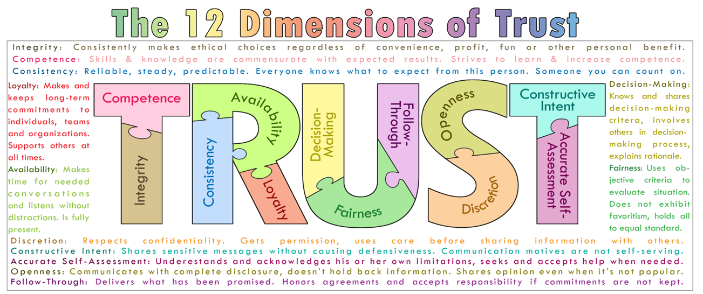The Links between Bi-Directional Trust and Employee Engagement
Trust is the “reliance on the integrity, strength, ability, surety or a person; confidence in another.”
Sounds like a good thing to have in any workplace relationship. Unfortunately:
- 55% of CEOs think that a lack of trust is a threat to their organization’s growth. (2016 global CEO survey,PwC)
- 24% of employees don’t trust their employer (American Psychological Association)
- 35% of employees do not trust senior leadership at their organization (OC Tanner)
That leaves a lot of room for improvement.
Is Trust a 2-Way Street in Your Organization?
In manager training and leadership development workshops, I frequently hear managers and executives lament about how employees can’t be trusted. This prevents them from delegating work, promoting internally, and entrusting employees with decisions about how to do their own work. It leads to a lot of micro-managing, excessive meetings with way too many people, bottlenecks that inhibit change that would improve work processes, and low morale.
At the same time, managers and executives often fail to earn the trust of employees, too.
- 76% of employees don’t trust bosses who fail to share company data (GeckoBoard)
- A lack of supervisor support created distrust among workers (56%) for their employers (APA)
This is because trust is a 2-way street. We seldom trust people who don’t trust us, especially when we don’t understand why they mistrust us.
In fact, in the workplace, trust is terribly misunderstood. Most people think “trustworthy” is synonymous with honesty or integrity. But those are just two out of 12 Dimensions of Trust. Click on the link to download a self-assessment and identify what causes you to mistrust others (or could cause them to mistrust you!)
One of the biggest challenges for managers is to “re-trust” people who have breached trust in the past. But how can people regain your trust if you don’t give them opportunities to reprove themselves? How can you encourage people to take risks, fail, learn, and try again if anything short of perfection is going to cause a permanent penalty of mistrust?
You’ve probably also heard that “trust is earned, not given.” What does it take, though, to earn someone else’s trust? Time? Extraordinary achievement? Perfection? Are these realistic measures in a fast-paced workplace where people need to be trusted in order to do their best work? Expecting people to earn trust rather than assuming they can be trusted may be an impediment to employee engagement and 2-way trust throughout the organization.
The Links between Trust and Employee Engagement
Engaged employees work harder and deliver markedly higher business results. Employee engagement matters. One of the drivers of employee engagement is an employee’s ability to trust their boss.
- 93% of employees said trust in their direct manager is important to remain satisfied at work (Ultimate Software)
- 83% of employees experienced a more positive work environment when they felt there was trust in their managers/organization (IBM)
- 32% of a worker’s loyalty is the result of feeling trust towards their boss (Mark Murphy, How to Build Trust in the Workplace)
That makes trust a business imperative.
Next Steps for Building Bonds of Trust in Your Organization
You’ll need to be proactive if trust has been breached in your organization. It doesn’t matter whether or not feelings of mistrust are deserved. Any real or perceived breach in any one of The 12 Dimensions of Trust can be costly to the business. Allowing mistrust to linger and fester only exacerbates the problem.
To start restoring or preserving trust in the workplace:
- Use the Team Assessment Report to understand your team’s issues when it comes to trusting you and/or trusting each other.
- Assess yourself on The 12 Dimensions of Trust.
- Address any toxic traits or behaviors you may be displaying.
- DWYSYWD – that stands for Do What You Say You Will Do. It’s an imperative building block for credibility and trust. You can’t expect others to believe in you if you don’t follow through on the promises and commitments you make.
- Work on trust openly and routinely. PFPS facilitators will craft and deliver a team effectiveness retreat to get you started and help restore 2-way trust in your team.
Don’t treat trust like an afterthought. It’s not some happenstance by-product of your intentions and commitment. It stands alone and is multi-faceted, meriting its own attention and deliberate focus. And it’s well worth the attention you’ll give it.
Does your organization's trust need a check-up? Partner with PFPS today!

